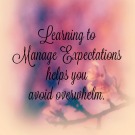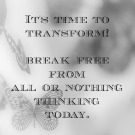One of the kindest and most self-affirming things we can do for ourselves is to learn to set and maintain healthy boundaries, both in our personal lives and at work. But so often we find ourselves not setting boundaries despite really wanting to. Worse, when we do set them, we still find ourselves feeling as though we’re not a priority, or that we’re unfairly taken advantage of, or that every time we decide to draw a line in the sand, someone else chooses to redraw it for us.
Let’s bring a halt to that now by discovering why people don’t set boundaries, why we need them, how to set and maintain them, and an unexpected benefit of setting healthy and effective boundaries.
Why We Don’t Set Boundaries
People don’t set boundaries for a variety of reasons. Some may not have been raised in homes where appropriate boundaries were set (or the boundaries that were set never resonated with them and they’re looking to change them as adults). Others believe that setting boundaries is selfish and when they’ve tried to set them they wound up feeling guilty or ashamed. Lastly, many of us have tried to set and maintain boundaries only to have someone else redraw the line in the sand. Our experience with boundaries has become defeating, and so we gave up.
There are (at least) four reasons why people don’t set boundaries, and those are:
- Fear
- We don’t know we need to
- We assume we already have
- We assume others have our same boundaries
Fear is one of the biggest reasons we do not set healthy boundaries. We are afraid of:
- Getting in trouble at work
- Being labeled as difficult, argumentative, etc.
- Being shunned or expelled from peer/family groups
We are often our own worst enemies when it comes to fear. We assume things that aren’t true. We tell ourselves “something negative” will happen but we’re not sure what that “something” is. If fear is keeping you from taking even a small step toward setting a boundary, there is hope, keep reading.
As we face various experiences in life, we sometimes realize (often suddenly) that we need to set new boundaries because we haven’t had to in the past. Maybe we’re in a new work situation or have moved to a new city with a different culture. Other times, we assume we already have set a boundary when in fact we haven’t been specific in our conversations. Lastly, we can neglect to put boundaries in place because we assume others have the same boundaries that we do, and we discover they don’t.
Not setting boundaries and then realizing we need to is an opportunity to learn, not an opportunity to beat ourselves up. By understanding why we haven’t set limits in the past, we can start to understand why they’re important.
Why Boundaries Are Important
The most important reason to set and maintain strong boundaries is to keep us safe and healthy. This goes beyond our obvious physical safety and touches on our emotional and mental safety as well. Emotional and mental abuse can have long-lasting and even tragic results so it’s important to consider how you can set boundaries for all three of these.
Beyond the obvious safety reasons, boundaries are also important because they:
- Show respect and love for ourselves
- Teach others how to treat us
- Allow us to serve as role models for others
Having weak and unhealthy boundaries can crush our self-esteem and self-worth. Our confidence will be shaky, and our sense of value as a person can be severely diminished. It is not selfish to respect and value ourselves and to demand a certain level of respect from others. By modeling our behaviors around boundaries, we show others how to treat us and that we will not be victims or be victimized. By showing respect to ourselves and by valuing ourselves, we also become role models for others such as our children or coworkers.
Daring to set boundaries is about having the courage to love ourselves,
even when we risk disappointing others.
–Brene Brown
Setting and Managing Boundaries
Boundary setting is an incredibly liberating, daring, sometimes scary but ultimately freeing exercise. Start first by getting specific about where and why you need to set a boundary. Ask yourself where your biggest pain point or frustration is both at home and work. More importantly, look for feelings of resentment. Resentment, according to Self Esteem, is a gift. It doesn’t look or feel like a gift when you’re living it, but resentment is a sign that you need to set a boundary.
An effective way to set a boundary is:
- Get specific about what you can do first, and then set a small boundary for yourself (i.e. – time spent in certain circumstances, how you respond to a situation, etc.)
- Identify what you need from the situation (i.e. – more respect, less ambiguity, more structure, less structure, etc.)
- Identify who is violating the boundary and how they are specifically doing it
- Identify the feelings you have when the person violates the boundary (i.e. – offended, disrespected, frustrated, discouraged, unappreciated, etc.)
- Identify the specific behavior the person is engaging in (i.e. – using offensive language, belittling you in a meeting with coworkers, not giving you credit where credit is due, offering your assistance without your permission, etc.)
- Have the conversation
Did that last bullet point make you cringe? To echo Brene, at some point, you will have to dare and dare greatly, to have the courage to set a boundary even when it risks meaning disappointing someone else. Here are a few tips for having the conversation:
- Approach it from an informational standpoint and place of calm — no accusing or fingerpointing.
- Use the feelings you have paired with the specific behavior the other person engages in to make your point. Specifics are key here because they help the other person see the exact behavior you want to address. Examples:
- I feel disrespected when you offer my assistance on projects without my permission.
- I feel frustrated when direction is lacking on x project.
- I feel offended when you tell jokes that belittle x group of people.
- Offer a suggested behavior change (remembering that you cannot control the behavior of others, but can instead only make suggestions). Examples:
- I would appreciate it if you would run any new project duties past me before agreeing to offer my help.
- The type of direction that would be most helpful on x project would be a, b, and c.
- I would appreciate it if you didn’t tell jokes about x group of people in my presence.
- Consider the response of the other person
- Know you may have to repeat yourself, and if you do, determine how many times you’ll repeat yourself before moving on (this is boundary management and how many times you repeat yourself before taking action is 100% within your power).
The Unexpected Upside of Setting Boundaries
While you’ll undoubtedly come across people who will disregard your boundary and you’ll be forced to make big and sometimes painful decisions, such as ending relationships or leaving a job, you may be surprised by how people respond when you start setting boundaries.
One of the most surprising things is that when confronted with a kindly yet firmly worded boundary, people may realize they’ve inadvertently offended you or hurt you in some way, and they will be genuinely mortified. In most cases, people do not overstep your boundary on purpose; they simply may not know what they’re doing is an issue for you. When you bring the overstep to their attention in a calm, clear, and specific way, they are often truly sorry and are willing to address the specific behavior you’ve pointed out.
This is why it’s so important to have the conversation and to set the boundary; it frees both you and the other person. It frees you of your resentment and frustration, and it frees the other person because they know exactly how you feel and they can decide how they want to respond to your request. Relationships can be saved and even strengthened when each party sets boundaries and does it in a way that shows respect for themselves and the other person.
Setting boundaries is critical to maintaining healthy self-respect, self-worth, and a sense of safety across multiple areas of your life. By first starting with yourself, you learn how to set and manage boundaries before moving on to set them with other people. By being specific about the boundary you need to set, and why it’s important to you, you can have clear and effective conversations with others which may lead to a surprising level of understanding for both you and the other person. Setting boundaries is one of the kindest forms of self-love and self-care and helps you become your own best advocate.






